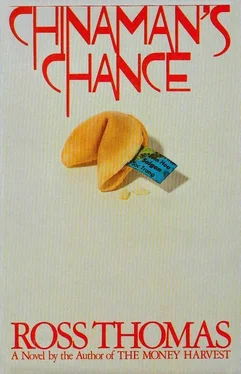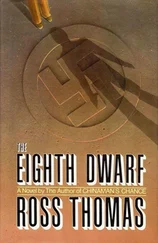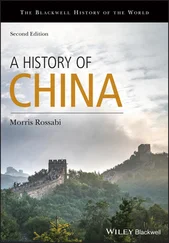The bank building had been bought cheaply by a group of wealthy men who founded the club because they wanted somewhere convenient and pleasant to go where they wouldn’t be bothered by picture people, which could be decoded into Jews. So the Woodbury Club became an Aryan haven and didn’t admit its first Jew until 1951. It still had no picture people as members, because it was felt that some standards simply had to be maintained. No one was now quite sure how the club had got its name, but most were content with the story that the founding members couldn’t agree on a name until one crusty old party went to the bathroom, washed his hands with a cake of Woodbury soap, came back to the meeting, and rammed the name through.
Durant and Wu arrived at the club at a little before one o’clock. There was no sign on the two-story granite building, only the street number and a small plaque that read PRIVATE. But if you looked very closely, you could still just barely make out the faint LIBERTY BANK & TRUST CO. above the entrance although it had been sandblasted away in 1933.
Inside the club there were a lot of old walnut paneling, thick carpet, leather furniture, and the hushed atmosphere of wise investments soundly made. Randall Piers, wearing a neat gray suit and tie, met Wu and Durant in the reception area, where they signed the guest book.
Artie Wu then asked for directions to the men’s room, partly because he had to go and partly because he wanted to see what it looked like, since Aggie Wu always demanded all the details whenever he went some place interesting.
Piers drew Durant to one side, out of earshot of an old gentleman who kept glancing at his watch impatiently and then ducking his head back into a copy of The Wall Street Journal.
“I’ve got a question,” Piers said.
“About the other night?”
Piers shook his head. “That’s past and forgotten — all right?”
“Fine. What’s your question?”
“Who are you, Durant, you and Wu?”
Durant took a moment before answering. “We’re pretty much what you see.”
“The pretty much is what bothers me.”
“Let me put it this way,” Durant said. “We’re going to get your sister-in-law back and then get whoever’s on her neck off of it. Permanently. She won’t have to hide anymore.”
“Silk was the key all along, wasn’t she?”
Durant nodded.
“Imperlino’s also involved somehow, right?”
“Up to his neck.”
“And this guy Simms — the one they used to call the Dirty Duke?” Durant smiled a little. “You’ve been busy.”
“When you get roped as slickly as I got roped, you like to know who did it and why.”
Durant nodded in mild approval. “Artie said you’d make us in five days. I said four. It’s four and a half, so we were both right.”
“How big is it?”
“We’re not quite sure, because some of it doesn’t make any sense yet. But it could be pretty big.”
“You mean a national mess?”
“Maybe.” Durant took out a Pall Mall and lit it. “Your sister-in-law probably has a big piece of it. This reporter who’s coming to lunch may have another, smaller piece, and Artie and I, we may have the key piece. If you’re still willing to play along, then when you get your sister-in-law back she can tell you all about it. If she wants to.”
Because he had a brilliant mind and liked to use it, it took less than a second for Randall Piers to make it up. “Okay,” he said. “I’ll play.”
“Good.”
“This reporter — you want me to dazzle him, right?”
“Right,” Durant said. “Would you like me to hum a few bars?”
Piers smiled for the first time. “No,” he said, “I think I’ve played it before.”
Shortly after Wu returned from the men’s room, Otherguy Overby arrived with the guest of honor, Herb Conroy, who was wearing his good blue suit and a mild vodka glow.
Piers bored in on Overby. “Maurice,” he said warmly to the man whom he’d never seen before in his life. Otherguy Overby was up for it.
“Randy, it’s good to see you.”
They shook hands the way men do who genuinely like each other but who meet all too infrequently. Piers swung around to Conroy. “And this must be Mr. Conroy, whom you’ve been telling me about.” Piers gripped Conroy’s hand and studied him for a moment. “I’ve been hearing a lot ol excellent things about you, Mr. Conroy. Really remarkable things.”
“Well, thank you,” Conroy said, and allowed himself to be turned by Piers toward Wu and Durant.
“These are two of my closest advisers, Dr. Wu and Mr. Durant. Gentlemen, Mr. Conroy — do you mind if I call you Herb?”
“Not at all.”
“And I’m Randy, of course,” Piers said as Conroy shook hands with Wu and Durant.
After the introductions were completed they filed into a small private dining room that Piers had engaged for the occasion, along with a small bar and a carefully instructed bartender. Still playing the expansive host, Piers suggested double vodka martinis all around. When those were drunk to the accompaniment of some highly flattering small talk aimed dead on at Herb Conroy, Piers insisted on another round of doubles, and by the time Conroy sat down at the table for lunch he was quite pleasantly in the bag, which was exactly where Wu and Durant wanted him.
When Conroy ordered a shrimp cocktail, a filet steak with Bearnaise sauce, a baked potato, and a salad for lunch, everybody flattered him further by ordering the same thing. Durant, however, said he would like some wine with the meal and ordered that and also another martini, but this time a single. Herb Conroy, his voice beginning to slur just a little, said he thought another single might be just the ticket.
“You know my magazine, The Pacific, don’t you, Herb?” Piers said.
“Yeah, I’ve read it.”
“What do you think of it? Be honest, now.”
“I think it’s pretty fucking dull,” Conroy said, and polished off the last of his second double martini.
“We’re thinking of making some changes, some rather drastic ones. We want to turn it into a hard-hitting, no-holds-barred kind of thing. Would you be interested in taking charge?”
“I could do a job on it,” Conroy said. “A real job. The only thing you’ve got in it now is who’s ruining the redwoods and where to eat and who’s screwing who in Hollywood.”
“You’d need a pretty big story for the first new issue,” Overby said.
“There’re plenty of big stories lying around that nobody’s got guts enough to print,” Conroy said. “Plenty of them.”
“Pelican Bay, for example?” Durant said.
“Yeah, for example.”
“We understand that there’re going to be certain, interesting changes made down there — economic changes,” Dr. Wu said in a rather academic tone.
“You don’t understand half of it, Professor. Not half.”
“Why haven’t some other newspapers or magazines sent in some reporters yet?” Durant said. “The L.A. Times, for example.”
“Why? You wanta know why?”
“Yes. Why.”
“Because they don’t know how far back it goes.”
“And how far back does it go?” Wu said.
“Back to ’53, that’s how far back. They haven’t connected now with back then, the way I have.” Conroy tried some of his fresh martini, the single. Then he tapped a forefinger significantly against his temple. “I’ve got it all up here — names, dates, the lot. And I’ve got files, too — confidential files that could blow it all out of the water.”
“I’ve been thinking in the neighborhood of fifty thousand dollars a year for the new managing editor,” Piers said. “Does that seem adequate to you, Herb? — with an expense account, of course, and a few other perks. It’s not a firm offer yet, of course, but I’d like to know if that’s in your ball park.”
Читать дальше












